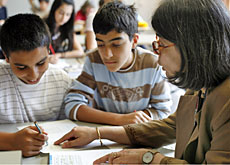
Integration measures focus on language

The government has announced more than 40 wide-ranging measures to improve the integration of foreigners, with languages and education taking centre stage.
But the announcement received only a lukewarm reception from the main political parties, with the centre-left Social Democratic Party describing it as a “long-winded report”.
Linguistic skills form a basis for success at school and in a job, according to the government, which on Wednesday said it would invest an additional SFr2.6 million ($2.15 million) in this area.
The authorities currently spend SFr14 million on integration.
“Language is the key to integration,” said Justice Minister Christoph Blocher, a member of the rightwing Swiss People’s Party.
Blocher added that in this respect the government, cantons and communities all had to work together to integrate foreigners better.
The People’s Party has been pushing for an ability to speak a national language (German, French or Italian) to be linked with a person’s residency permit – and a failure to improve language skills by a certain date would result in a permit being withdrawn.
The government also classed the better integration into the job market and the promotion of professional qualifications as a priority.
Personal responsibility
Eduard Gnesa, the director of the Federal Migration Office, said the measures would mainly be targeted at young foreigners, and they included improving residential areas for immigrants, public safety, sport, health and the fight against racism.
Nevertheless, the government emphasised that immigrants also had a personal responsibility to get to grips with Swiss habits and norms and to learn a national language.
It rejected on Wednesday however the naming of a commissioner to promote integration – something that had been demanded by the centre-left Social Democratic Party.
The government said such a position would lead to coordination problems with the Federal Migration Office.
Criticism
The political reaction to the government’s announcement was less welcoming.
The centre-right Radical Party said the measures were not sufficient to cope with future integration policies. They had wanted to see a “potential approach” – taking into consideration the potential of every individual – instead of the “reactive and selective” strategies in place until now.
The centre-right Christian Democratic Party said a way to tackle discrimination of immigrants in the hunt for jobs and housing was missing.
The Social Democrats said the measures didn’t bring anything new to the table. In their opinion the central principle should be “integration from the very beginning”, involving not only language courses but also events to provide information and contacts provided by the authorities.
“Peaceful co-existence”
Integration is a hot and divisive topic in Switzerland – as it is across Europe.
In a speech to mark Swiss National Day on August 1, Swiss President Micheline Calmy-Rey called for better integration of foreigners.
She said she understood that some people feared losing their identity, but peaceful coexistence with other cultures was the only solution, adding that it was important to put the emphasis on what united people, rather than what separated them.
“We know how to do this – Switzerland has always been a land of emigration and immigration,” Calmy-Rey said. “We have to decide: integrate or exclude.”
She admitted however that crime among young foreigners – a favourite topic of the Swiss political right – was high, but said this was a social not ethnic problem.
swissinfo with agencies
The foreign population of Switzerland in 2006 was 1,523,586 people.
They represent 20.4% of the total population.
Foreigners make up 25.4% of the population in the Italian-language region, 25% in the French-language area and 18.5% in the German-language part.
The Swiss electorate accepted the new law on foreigners with a clear 68% yes vote on September 24, 2006.
It limits immigration for citizens outside the European Union and the European Free Trade Association (Efta) to highly skilled labour.
It also aims to encourage integration, in particular by language courses, while cracking down on human trafficking and marriages of convenience.
Foreigners also have to make efforts towards integration, according to the spirit of the law.

In compliance with the JTI standards
More: SWI swissinfo.ch certified by the Journalism Trust Initiative



























You can find an overview of ongoing debates with our journalists here . Please join us!
If you want to start a conversation about a topic raised in this article or want to report factual errors, email us at english@swissinfo.ch.